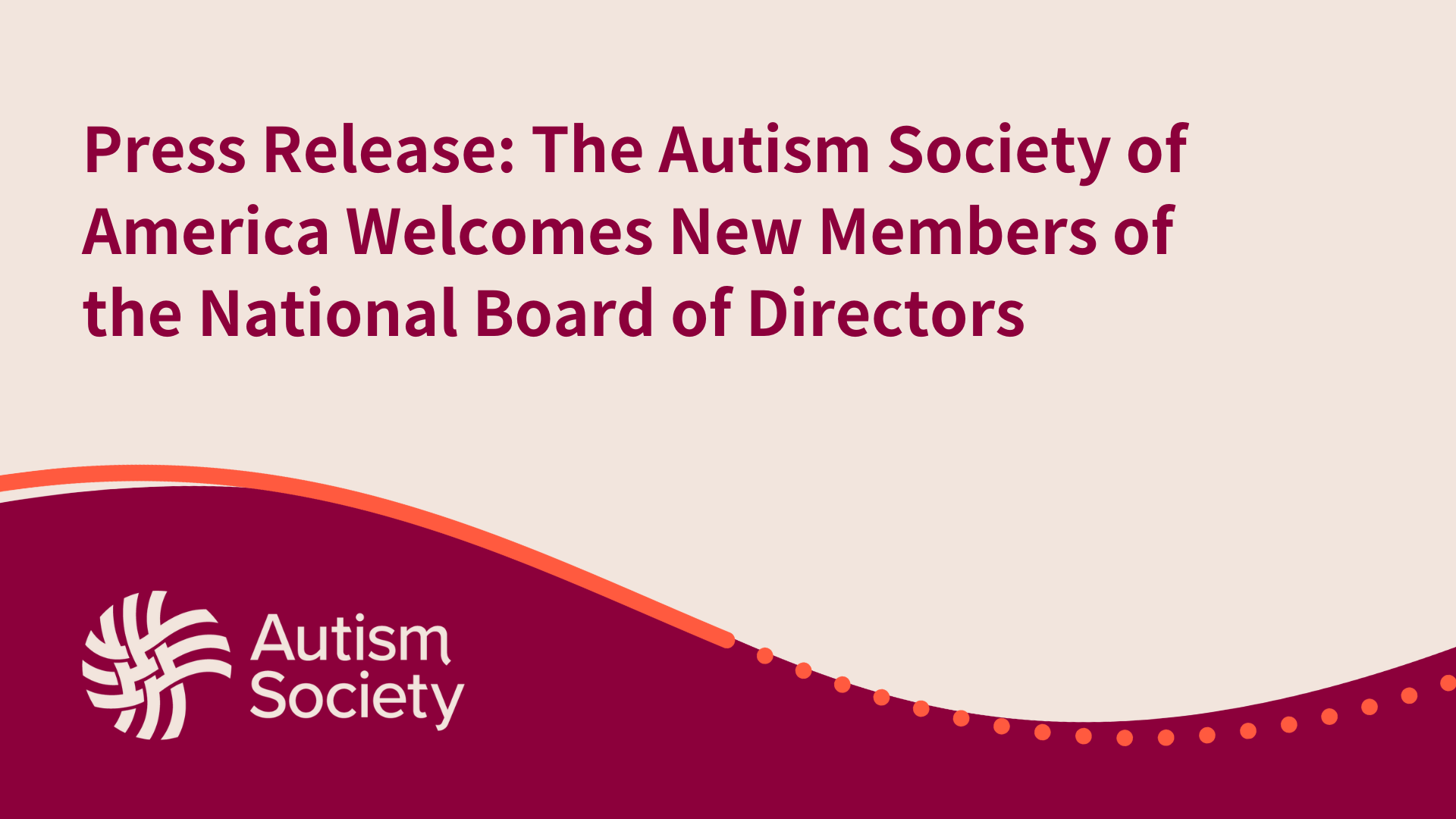
In this issue of Capitol Connection, Congress passed a continuing resolution avoiding a government shutdown. The CR included an extension of the Autism CARES Act to prevent programs from expiring while the Senate deals with objections to unanimous consent procedures. November 5 is Election Day. Please use the Autism Society’s Election Center to see a list of candidates and where to vote, among other resources.
Legislative Updates
Continuing Resolution
The House and Senate swiftly passed a Continuing Resolution (CR) to keep government programs running while Congress finalizes the funding bills. After controversial provisions were removed, the CR received broad support and was signed into law by President Biden on Thursday. The resolution includes a temporary extension of Autism CARES Act programs (see details below) and maintains level funding for most other federal programs through December 20. With the CR in place, Congress has recessed until after the November elections.
Autism CARES Act
The Autism Society has been a strong advocate for the timely reauthorization of the Autism CARES Act before its expiration on September 30. Unfortunately, the Senate was unable to pass the bill before the deadline. However, Congress included a temporary extension of the law within a Continuing Resolution (CR), which will keep the current provisions in place until December 20, 2024.
As previously reported in the September 19 Capitol Connection, the House of Representatives passed the Autism CARES Act of 2024 (H.R. 7213) on September 18 with overwhelming bipartisan support, in a vote of 402-13 (see Rep. Chris Smith mention the Autism Society). The bill was then sent to the Senate, where Senators supporting the legislation called for swift approval. Unfortunately, two Senators placed an anonymous “hold” on the bill, a procedural action that prevents the bill from moving forward without a debate and a minimum of 60 votes for passage.
With time running out, the Senate included a short-term extension of the law in the CR passed to ensure that government programs, including those under Autism CARES, continue operating while Congress finalizes the funding bills. When Congress reconvenes after the November 5 elections, we hope to resolve any remaining concerns and quickly pass the Autism CARES Act into law.
See the Autism Society’s summary of the current bill, HR 7213. Stay tuned for new Action Alerts following the elections, as your support will be crucial in advocating for the passage of this critical legislation.
Transformation to Competitive Integrated Employment Act
There is still a small chance that Congress will consider a bill to reauthorize several workforce bills following the elections. The Autism Society and other advocates urge Congress to include the Transformation to Competitive Integrated Employment Act in any workforce package moving through Congress. Learn more about this bill by reading the Autistic Self-Advocacy Network (ASAN) plain language resource. Please use the Autism Society’s Action Alert to educate members of Congress about the importance of supporting real jobs and stay tuned for new action steps in the lame-duck session.
HCBS and Military Families Legislation
The House recently passed H.R. 8108, a bill that seeks to prevent Medicaid HCBS coverage gaps for active-duty military members and their dependents who must move out of state for their service assignment. For active-duty military service members and their dependents who are receiving Medicaid HCBS, the bill would require States to maintain Medicaid coverage during their temporary relocation and for up to one year after the conclusion of the individual’s active duty. For such individuals who are not yet receiving HCBS but are on the waiting list to receive HCBS, it also would require States to maintain those individuals’ position on the waiting list, so that the time they spent on the waiting list prior to the need to move is not ‘‘lost’’. The bill was sponsored by Rep. Jennifer Kiggans (R-VA), along with three other co-sponsors. The bill now moves to the Senate where the path is unclear. For more information and background about the bill see the House Committee report.
Alzheimer’s and Autism Law
A bill to reauthorize the National Alzheimer’s Project Act (S 133/HR 619) through 2035 passed the Senate and President Biden signed it into law. The law, championed by Senator Collins (R-ME) and Rep. Tonko (D-NY) expands the project’s scope to include individuals with developmental disabilities. This project supports coordination of federal planning, programs, and other efforts to address Alzheimer’s disease and related dementias. See a fact sheet summarizing the current law for more information. There is limited research on the comorbidity of Autism and Alzheimer’s. However, some studies have shown that adults with Autism are at a higher risk of developing early-onset dementia, including Alzheimer’s. The Autism Society will be monitoring the implementation of this amended law.
Family-to-Family Health Centers Reauthorization
The House Energy and Commerce Committee passed a five-year reauthorization of the Family-to-Family Health Information Centers program with a $3 million increase in funding, for a total of $9 million for the program per year. This passed the committee unanimously as part of Rep. Buddy Carter’s (R-GA) bipartisan Telehealth Modernization Act of 2024 (HR 7623). The Autism Society will monitor this bill as it moves through Congress.
ABLE Provision Bill
Senators Casey (D-PA) and Schmitt (R-MO)’s Ensuring Nationwide Access to a Better Life Experience (ENABLE) Act passed the Senate. This bill would make three provisions of ABLE permanent including the ABLE to work provision, the ABLE Saver’s Credit, and the 529 to ABLE rollover provision. It has yet to move through the House. See more at Senator Casey’s press release.
Senate Budget Committee Hearing
On September 11, 2024, the Senate Budget Committee held a hearing entitled, Social Security Forever: Delivering Benefits and Protecting Retirement Security. SSA Commissioner Martin O’Malley provided the lead testimony. He outlined multiple steps to streamline services to make them more efficient but still, he warned that the Social Security Administration continues to be significantly underfunded, leading to a staffing and services crisis. He also emphasized that reports of Social Security going bankrupt are inaccurate. “So long as Americans across our country continue to work, Social Security can—and will—continue to pay benefits.” Read the full testimony. NASI’s Chief Executive Officer, Rebecca Vallas’ testimony also touched on the importance of Supplemental Security Income (SSI) benefits and policy options to increase revenues for Social Security.
Autism Society Voting Workshop
The Autism Society and the National Association of Councils on Developmental Disabilities hosted a workshop entitled “Ready, Set, Vote: Your Guide to Election Day Preparation” on September 17. A panel of self-advocates including Sam Brandsen, Tyson Bedford, and Kelly Israel discussed ways that they research and ensure they are ready to vote. In addition, Denise Resnik presented the campaign, Vote the Spectrum, which aims to educate voters with all types of disabilities about the importance of voting. Watch and share the recording here.
Administrative Updates
CMS Training Series on HCBS Provisions in Medicaid Access Rule
CMS is hosting a series of webinars to educate the public on the home-and-community-based services provisions of the new Ensuring Access to Medicaid Services final rule, also known as the Access Rule, with the first being on October 9. See more information and register here.
Medicaid Advocacy Resources
The National Health Law program updated its “Protect Medicaid” fact sheet series. This includes a “Medicaid Fast Facts” providing readers with all the relevant Medicaid data as well as 14 fact sheets focused on different Medicaid populations or services. The fact sheets highlight the importance of Medicaid’s open-ended entitlement funding and the harm that any potential funding cuts (such as those mentioned in Project 2025) would cause.
IACC Strategic Planning Meeting
The Interagency Autism Coordinating Committee met on September 23 to review the draft of the 2024 IACC Strategic Plan Update. The update focuses on co-coordinating conditions the Autistic community faces and how this impacts health outcomes. It identifies additional needs for research, services, and policy suggestions.
Housing Webinar on Section 811
The United States Department of Housing and Urban Development is hosting a webinar on October 16 at 3 PM ET to discuss the ways that the Section 811 Project Rental Assistance (PRA) Program can leverage mainstream affordable housing resources, Medicaid services, and other community-based supportive service resources to ensure that extremely low-income persons with disabilities can access the housing and services they need to live as independently as possible within integrated community-based settings. More information and registration instructions can be found here.
Justice Corner
The Autism Society of Maryland, in coordination with the Autism Society of Baltimore, hosted a webinar entitled “What to do if your Child is Arrested.” The panel, featuring first-hand experiences and criminal legal experts, was moderated by Carlean Ponder, director of the Autism Society’s Autism Justice Center. Feel free to watch and share the recording.
Share:





